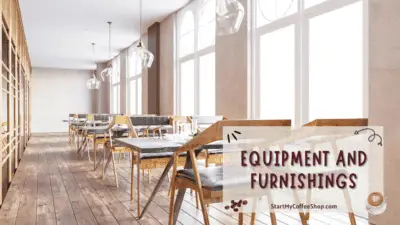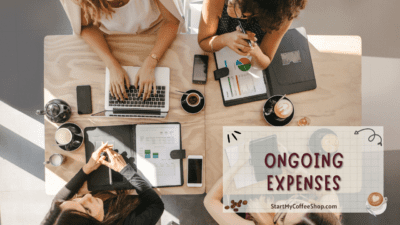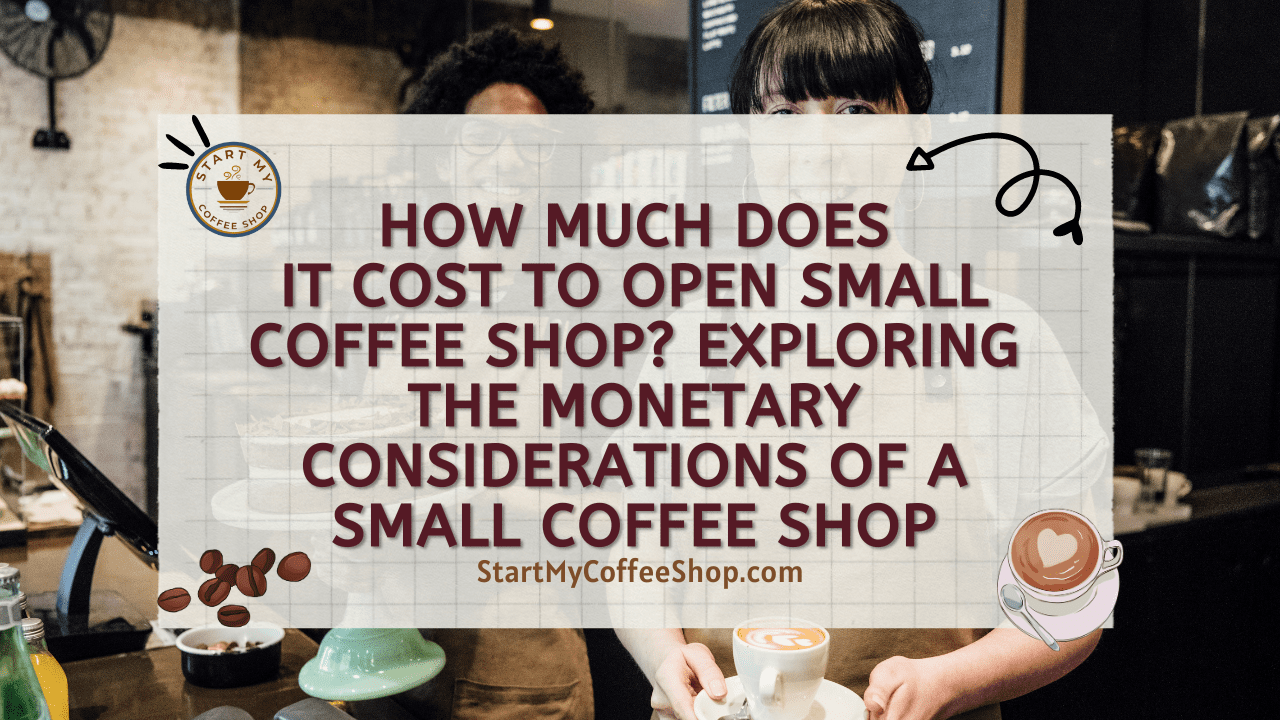Opening a small coffee shop can be an exciting and fulfilling venture, but it’s essential to have a clear understanding of the costs involved. From securing a location to purchasing equipment and inventory, there are various expenses to consider.
The estimated cost can range anywhere from $10,000 to $50,000. Of course, this can vary depending on factors like your location, the size of the shop, equipment needed, renovations, permits, and initial inventory. It’s important to plan your budget carefully and consider all the necessary expenses.
In this article, I will explore the factors that influence the cost of opening a small coffee shop and provide a comprehensive breakdown of the estimated expenses involved.
1. Location
The location of your coffee shop is a key factor that influences the overall cost of opening and operating the business. Rental prices can vary significantly depending on the city, neighborhood, and even the specific location within a city. Generally, high foot traffic areas or trendy neighborhoods tend to come with higher rental costs due to the potential for increased customer visibility and demand.
When considering the location of your coffee shop, it’s crucial to conduct thorough research and analysis. Factors such as accessibility, proximity to residential and commercial areas, parking availability, and public transportation should be taken into account. Understanding your target market and its preferences can help you identify areas where your coffee shop is likely to thrive.
In addition to monthly rental fees, there may be additional costs associated with securing a location. These costs can include lease deposits, which are often equivalent to a few months’ rent, as well as legal fees incurred during the lease negotiation and drafting process. Seeking the assistance of a professional, such as a real estate agent or lawyer, can help navigate these complexities and ensure a favorable lease agreement.
2. Renovations and Interior Design
Creating a warm and inviting ambiance is crucial when transforming a space into a coffee shop. Renovations and interior design work play a significant role in achieving this goal. The extent of renovations and customization required will depend on the existing condition of the space and your specific vision for the coffee shop.
Renovations may encompass structural modifications to optimize the layout and flow of the space. This could involve knocking down walls, building partitions, or adding additional rooms or seating areas. Flooring is another aspect that may require attention, with options ranging from durable tiles to hardwood or polished concrete floors.
The color palette and overall aesthetic of the coffee shop can greatly impact the customer experience. Painting the walls in inviting tones and incorporating tasteful decor can enhance the ambiance. Lighting is also a crucial element that sets the mood and highlights different areas. From warm and cozy lighting fixtures to accent lighting for displays and counters, careful consideration of lighting options is essential.
Plumbing and electrical work are practical aspects that need to be addressed during renovations. This may include installing sinks, and plumbing for coffee machines and equipment, and ensuring proper electrical outlets to accommodate appliances and lighting fixtures.
The costs associated with renovations and interior design will vary depending on the scale of the project and the level of customization desired. Collaborating with an experienced contractor or interior designer can provide valuable insights and help estimate expenses accurately. They can offer guidance on cost-effective solutions, source materials, and manage the renovation process efficiently.
3. Equipment and Furnishings

The costs associated with equipment can accumulate rapidly, and it’s important to allocate a significant portion of the budget to this category. Key equipment items include espresso machines, grinders, brewing equipment, refrigeration units, and point-of-sale (POS) systems.
Espresso machines are the heart of any coffee shop, and their quality directly impacts the taste and consistency of the beverages served. Grinders play a crucial role in achieving the perfect grind size for espresso and other brewing methods. Brewing equipment, such as pour-over stations or drip coffee makers, ensures the ability to cater to different customer preferences.
Refrigeration units are necessary for storing milk, syrups, and other perishable ingredients, maintaining their freshness and safety. POS systems streamline operations, enabling efficient order taking, inventory management, and transaction processing.
Aside from equipment, furniture, and fixtures contribute to the overall ambiance and functionality of the coffee shop. Tables, chairs, countertops, and display cabinets should be chosen with both aesthetics and durability in mind. Investing in comfortable seating arrangements and visually appealing displays can enhance the customer experience.
While it’s crucial to prioritize quality, finding a balance with affordability is also important. Consideration should be given to both the upfront costs of purchasing equipment and the long-term maintenance expenses. Quality equipment often comes with better reliability, performance, and lifespan, which can reduce repair and replacement costs in the future.
Read more about Cost to Open Coffee Shop Average: From Concept to Cash Register
4. Licenses and Permits
Operating a coffee shop involves obtaining various licenses and permits, and the specific requirements can vary depending on your location. It is important to adhere to the regulations and legal obligations set by local authorities. These licenses and permits typically include health permits, food service licenses, business registrations, and liquor licenses if you plan to serve alcoholic beverages.
Health permits are essential to ensure that your coffee shop meets health and safety standards. These permits involve inspections to verify the cleanliness of the premises, proper food handling practices, and compliance with sanitation guidelines.
Food service licenses are necessary if you plan to prepare and serve food alongside your coffee offerings. They ensure that you meet the specific regulations related to food handling, storage, and preparation, ensuring the health and well-being of your customers.
Business registrations are required to legally establish your coffee shop as a business entity. This process involves registering your business name, obtaining a tax identification number, and complying with any local business ordinances.
If your coffee shop intends to serve alcoholic beverages, you may need to obtain a liquor license. The process for acquiring a liquor license can be more complex, involving additional fees, background checks, and specific requirements related to alcohol service.
The costs associated with licenses and permits can vary depending on your location and the specific requirements. These expenses can include application fees, inspections, and legal consultations to ensure compliance. It’s crucial to thoroughly research the licensing requirements in your area and allocate funds accordingly in your budget.
5. Initial Inventory
When opening a coffee shop, one crucial expense to consider is stocking your inventory with a wide range of essential items. This includes coffee beans, tea leaves, syrups, milk, baked goods, disposable cups, and various other supplies necessary for daily operations. The cost of your initial inventory will depend on factors such as the size of your shop, the complexity of your menu offerings, and the suppliers you choose.
To manage costs effectively, it’s beneficial to build strong relationships with local vendors. Local suppliers often offer competitive prices and can provide fresher ingredients, contributing to the quality and taste of your beverages and food. Additionally, they may offer more flexible terms, such as smaller minimum order quantities, which can be advantageous for a small coffee shop.
Considering wholesale options is another way to save on inventory costs. Buying in bulk from wholesale suppliers can often lead to significant discounts, reducing your overall expenses. However, it’s essential to strike a balance between purchasing in bulk and ensuring that the items you stock have a reasonable shelf life to avoid wastage.
Investing in high-quality ingredients is crucial for delivering exceptional products to your customers. While premium ingredients may come with a higher price tag, they can significantly enhance the flavor and overall experience.
6. Marketing and Branding
Promoting your coffee shop is vital for attracting customers and cultivating a loyal following. It’s important to factor in the costs associated with marketing materials, including signage, menus, business cards, and a website. These materials serve as powerful tools for communicating your offerings and creating a cohesive brand image.
Investing in professional logo design and branding materials helps distinguish your coffee shop from competitors and leaves a lasting impression on customers. A well-crafted logo and consistent branding across various touchpoints contribute to brand recognition and customer loyalty.
In the digital age, allocating a portion of your budget to online advertising and social media campaigns is crucial. Targeted online ads can reach a broader audience while engaging social media content helps build a community and attract potential customers. Additionally, setting aside funds for local community outreach initiatives, such as sponsoring events or collaborating with neighboring businesses, can enhance your coffee shop’s visibility within the local market.
Regularly reviewing and adjusting your marketing strategies based on their effectiveness is key to maximizing your promotional efforts. By prioritizing promotion and allocating a budget to various marketing initiatives, you can effectively attract customers, foster brand loyalty, and establish a strong presence in the competitive coffee industry.
7. Ongoing Expenses

Monthly rent is a significant expense that needs to be factored into your budget. Alongside rent, you should account for utilities such as electricity, water, and internet services. These are essential for running your coffee shop smoothly.
Salaries for your employees should also be included in your ongoing expenses. This ensures that you can attract and retain talented staff members who will contribute to the quality of service and overall customer experience.
Inventory restocking is an ongoing cost that varies depending on your sales volume and menu offerings. Regularly monitoring inventory levels and estimating the costs of replenishing items such as coffee beans, milk, syrups, and other supplies is crucial to avoid shortages.
Maintenance and repairs are inevitable expenses for any physical establishment. Allocating funds for regular maintenance and addressing unexpected repairs helps keep your coffee shop in optimal condition and ensures a pleasant environment for your customers.
Waste management is another ongoing expense to consider. Proper disposal of waste, recycling efforts, and potential composting initiatives contribute to environmental sustainability while aligning with responsible business practices.
Finally, dedicating a portion of your budget to ongoing marketing efforts is essential for maintaining visibility and attracting new customers. This can include social media advertising, local promotions, and other marketing strategies to drive customer engagement and loyalty.
Estimating and managing these ongoing expenses will contribute to the long-term progress and financial sustainability of your coffee shop. By maintaining a solid grasp on your budget and cash flow, you can navigate operational challenges effectively and ensure the continued growth and profitability of your business.
Read more about Cost to Open Coffee Stand: Evaluating the Financial Commitment to a Coffee Stand
Summary
Opening a small coffee shop requires careful financial planning and consideration of various factors. While the estimated cost can range from $10,000 to $50,000, it ultimately depends on your specific circumstances, location, and business goals.
By conducting thorough research, creating a detailed budget, and seeking professional advice when necessary, you can embark on this exciting journey with confidence. Remember, a well-planned investment can lead to a thriving coffee shop that delights customers and becomes a cherished part of the community.
Frequently Asked Questions

What are the essential equipment and furnishings needed for a coffee shop?
Essential equipment for a coffee shop includes espresso machines, grinders, brewing equipment, refrigeration, and POS systems. Furnishings such as tables, chairs, countertops, and display cabinets are also important to create a comfortable atmosphere.
Are there ongoing expenses to consider besides the initial investment?
Yes. These include monthly rent, utilities, employee salaries, inventory restocking, maintenance and repairs, waste management, and marketing efforts.
Do I need any licenses or permits to open a coffee shop?
Yes. These may include health permits, food service licenses, business registrations, and liquor licenses if you plan to serve alcoholic beverages.
To learn more on how to start your own coffee shop checkout my startup documents here
Please note: This blog post is for educational purposes only and does not constitute legal advice. Please consult a legal expert to address your specific needs.

Hi! I’m Shawn Chun
My adventure in coffee began when I first launched my first coffee shop back in the early 2000s. I had to figure out so many things on my own and to make it worse within 2 years of opening two large corporate coffee chains moved in just blocks away from me!
As I saw smaller and even some larger coffee shops in the neighborhood slowly lose customers to these giant coffee chains and slowly close up shop, I knew that I had to start getting creative…or go out of business.
I (like you may be) knew the coffee industry well. I could make the best latte art around and the foam on my caps was the fluffiest you have ever seen. I even had the best state-of-the-art 2 group digital Nuova Simonelli machine money could buy. But I knew that these things alone would not be enough to lure customers away from the name brand established coffee shops.
Eventually, through lots of trial and error as well as perseverance and creativity I did find a way to not only survive but also thrive in the coffee/espresso industry even while those corporate coffee chains stayed put. During those years I learned to adapt and always faced new challenges. It was not always easy, however, in the end, I was the sole survivor independent coffee shop within a 10-mile radius of my location. Just two corporate coffee chains and I were left after that year. All told the corporate coffee chains took down over 15 small independent coffee shops and kiosks and I was the last one standing and thriving.
Along the years I meet others with the same passion for coffee and I quickly learned that it is not only “how good a barista is” that makes a coffee shop successful, but the business side of coffee as well.
Hence why I started this website you are on now. To provide the tools and resources for up and coming coffee shop owners to gain that vital insight and knowledge on how to start a coffee shop successfully.
Stick around, browse through my helpful blog and resources and enjoy your stay! With lots of LATTE LOVE!
Shawn







